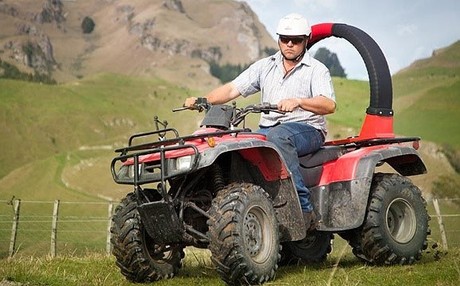
A UNSW study of quad bike safety on farms and other workplaces has found that one in two riders has crashed and about two-thirds of the crashes involved rollovers, putting riders at risk of serious chest injury and asphyxiation.
The Quad Bike Workplace Safety Survey, carried out by a team from the UNSW Transport and Road Safety Centre (TARS), also found that rollbar-type operator protective devices (OPDs) attached to the rear of a quad bike appeared to help reduce serious chest injuries in rollovers.
However, the researchers emphasise that OPDs do not reduce the incidents of rollover and that riders in the workplace should consider using the most suitable and safest vehicle for the task or circumstances.
“Our study is the largest carried out to date on workplace experiences of quad bike riders with regard to their use of OPDs and quad bike specific helmets in Australia, and also includes results from New Zealand,” said team leader UNSW Professor Raphael Grzebieta and team member Adjunct Associate Professor George Rechnitzer.
“Significantly, there have not been any fatalities identified in this study or elsewhere where these OPDs caused a fatal injury,” Professor Grzebieta said.
On the other hand, 55 people were hospitalised, with 24 receiving serious chest injuries, in the rollover crashes where the quad bike had no OPD fitted.

Some other key findings from the UNSW project included:
- Riders 70 years or older had more than double the risk of being injured than young adult riders.
- Mustering livestock on farms is a high-risk activity for crashing. It is likely this is because the rider’s attention is distracted away from the essential task of controlling the quad bike while negotiating the uneven farming terrain.
- When a quad bike rolls over the rider, the risk of a serious injury is more than six times higher than in a crash where the quad bike does not roll over the rider. Rollover is a major significant safety risk hazard of operating a quad bike.
- The in-field data is suggestive that Quadbar or Lifeguard OPDs reduce serious chest injuries in rollovers to some extent.
- Consistent with the known benefits of wearing helmets in other transport domains, the in-field data is suggestive that quad bike helmets reduce serious head injuries in quad bike crashes.
- Quad bikes without a rollover protection system have a limited ability to prevent serious injuries in both low- and high-speed rollovers.
This project was funded by SafeWork NSW and the full report is available for download here.
Food delivery deaths spark NSW investigative taskforce
On 24 November, the NSW Government established a taskforce to investigate the gig economy,...
Further $310K in fines follow Melbourne construction site collapse
An engineering company and its director face further fines for health and safety failings over...
Workplaces urged to stay safe in lead-up to Christmas
As Victoria recovers from its second wave and more people return to work, employers are reminded...











